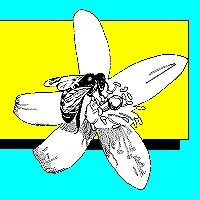APIS Volume 8, Number 1, January 1990

In this issue
- Planning for the African Bee's Arrival
- A Glimpse of Florida Beekeeping Video
PLANNING FOR THE AFRICAN BEE'S ARRIVAL
There have been several meetings over the last year to develop a Florida African Bee Plan. Although for Florida the invasion is some years away, the bees are projected to cross the Texas border in 1990. This is fortunate for Florida because there will be time before the invasion gets here to fine tune any plan that might be developed. Nevertheless, this is the time to begin consideration in earnest of how beekeepers, educators and regulators will confront the inevitable arrival of the African bee.
At the Federal level, an action plan already exists. This was published by USDA APHIS in the past and continues to be in force. However, there remains a fundamental problem as pointed out by Mr. Binford Weaver at the American Beekeeping Federation meeting recently in Las Vegas. The APHIS action plan was conceived when spot introductions were considered major problems and the industry was concerned about introduction of the Varroa bee mite along with the African bee. Sporadic introductions, usually by ship along the U.S. coasts, are still being handled by APHIS according to the plan. Texas, Mr. Weaver's state, however, is now faced with a full frontal invasion of swarms along its substantial border with Mexico. And the Varroa bee mite has already gained a foothold in the United States. In spite of these facts, much of the Texas African Bee Plan is still based on what Mr. Weaver and others see as an outdated APHIS document.
APHIS' response to Mr. Weaver's question at the convention, by Mr. Chuck Bare, was that no plan now exists for a frontal invasion, nor is one likely to be quickly prepared. Within this context, it must be remembered that APHIS' role is only to prevent introduction of pests and to exterminate incipient outbreaks. The classic case of this over the last two decades has been eradication of the Mediterranean fruit fly in both California and Florida using widespread application of baited sprays. Numerous infestations have indeed been wiped out. However, after detection of both tracheal and Varroa mites, APHIS was forced to abandon efforts to eradicate these pests and gave subsequent regulatory responsibility to the states. The practical result has been and continues to be a hodgepodge of rules and regulations concerning bee movement. The question many are asking is what role APHIS will take when the bee crosses the Texas border.
APHIS' role will affect any plans made. However, most persons in Florida are expecting this bureaucracy to quickly wash its hands of the issue when it becomes apparent the African bee has been established on U.S. soil. This will leave the states again with the final burden of authority and responsibility in regulating beekeepers. Because Florida will be more affected than most states, the regulatory authority, Division of Plant Industry (DPI), Department of Agriculture and Consumer Services (DACS), has been requested by its advisory body, the Honey Bee Technical Council, to develop a plan. Originally, the Council's idea was to simply make the population of Florida aware of the bee and its potential effects. Since then, research, training and regulatory issues have been added.
Deliberations by a number of persons culminated in the development of a proposal for increased funding to go to both DPI and the University of Florida's Institute of Food and Agriculture Sciences (IFAS). This awareness plan was put before the legislative House Agriculture Committee in October last year. Part of the presentation was an in-house video tape entitled,
Based on the ideas published in Plan B and others, a proposal for the Florida plan was presented to the Africanized Honey Bee Task Force in December. It consisted of four directions or thrusts, listed major goals and persons in charge and suggested a yearly budget. The time of the plan is for five years; its breakdown is as follows:
- Public awareness under direction of Ms. Phyllis Habeck, DPI, with a budget of $50,000 per year. Major directions are to let the public know directly and through other state agencies about the bee. Specific audiences are governmental offices (cities and counties), tourist bureaus, civic groups and schools.
- Research under direction of Dr. Glenn Hall, IFAS, with a budget of $134,000 per year. Major emphases are to study methods of identification and stock certification and the process of genetic interactions. This program is also expected to establish baseline information and study the bees' dispersal patterns. Finally, it will consult and collaborate with the USDA laboratories concerning managing both feral and domesticated bee populations.
- Training under direction of Dr. Tom Sanford, IFAS, with a budget of $50,000 per year. Major emphases are training beekeepers, other agriculturalists, pest control operators, bee inspectors and the scientific community. Specific topics to be addressed include locating and eliminating feral colonies by pest control operators, fire departments and police agencies; educating employees of agricultural enterprises about potential problems of more bees in their work environment; and training beekeepers in stock management.
- Regulatory under direction of Mr. Laurence Cutts, State Apiarist, DPI, with a budget of $355,000 per year. This amount is over and above the current budget of the Apiary bureau which is about $350,000 per year. Major thrusts are to implement regulations on the beekeeping community. Specific areas are stock beekeeper registration, certification, movement regulation and providing information to other agencies which might aid in this effort, such as fire and forestry departments. There will be a training component here as well for bee inspectors, beekeepers, law enforcement agencies and others.
It is not known at this time what the next step might be in order to implement the proposed plan. However, it is proposed to approach the Florida Senate Agriculture Committe or perhaps a joint session of House and Senate Ag Committees about increased funding sometime this legislative session . That, of course, is where the beekeeper as ordinary citizen comes in. In a state that is short on resources, a total annual budget approaching $600,000 is not inconsiderable. It will require support by the beekeeping community and public at large, if any part of these funds are to be approved. The position of some persons on both the Africanized Honey Bee Task Force and Honey Bee Technical Council is that probably some increased funding will be forthcoming, but not the full amount requested. This will require further hard decisions on where scarce funds should go to best address problems faced by the general public or the beekeeping industry with the arrival of the bee.
All this brings to mind the writing of Dr. Elbert Jaycox, retired from the Illinois Cooperative Extension Service, who said in the January, 1990 issue of Gleanings in Bee Culture: "There is no lack of candidates for leadership or of ideas about how we will deal with the African bees when they cross our southern border, perhaps this year. We will poison them, exclude them, outbreed them, and trap them, if you believe the proposals that have been presented. Yet how can you have faith that we will exert any effect on the invasion when you look at the two previous debacles in handling the advent of two other serious pests (tracheal and Varroa mites) in the United States? The biggest effects fell on beekeepers, putting many out of business and still damaging others by regulations and enforcement established on a false base-that you can detect mites and save money by taking small samples of bees for diagnosis."
"We have equally fallacious ideas about how we will deal with African bees. They are fallacious because they are based on the idea that we will be able to spend large sums of money on control measures and regulatory action designed to maintain European honey bee stock in areas suitable for African bees. These include certifying and inspecting for European queens and destroying hundreds of thousands of colonies. I can only offer a simple prediction: we will not find the sums needed and we will not prevent the widespread distribution of African bees and their hybrids in the U.S. It is also easy to predict that these things will come true in spite of many controversial and damaging programs (to beekeepers) instituted by state and federal organizations. They will be so busy trying to put the clamps on bees and beekeepers that we will get little help in a breeding program to give us productive strains with African blood and resistance to Varroa mites yet docile enough to keep beekeepers in the pollinating business. All of us are greatly concerned about the actions that may be taken when the Africans arrive. Also it is easy to put blame on regulatory agencies for programs that do not work. Yet, in most cases, it is the beekeepers' reactions, especially those of non- commercial operators, that are responsible for the laws and regulations put into force and then, later, withdrawn as unworkable. Before you decide to support some of the schemes being proposed to keep your area, or all of the United States, free of African bees in the '90s, consider whether they are based on reality, including the heavy expenditure of funds for many years."
Although some of Dr. Jaycox's ideas are debatable and controversial, his final message cannot be ignored. Beekeepers' and other citizens' tax money will be allocated on plans to deal with the African honey bee. It will be up to everyone concerned to make a determination about how much and how wisely these funds will be spent. The Florida African Bee Plan is no exception. Please communicate your thoughts to your legislators directly or through members of the Agriculture Commissioner's Africanized Honey Bee Task Force or Honey Bee Technical Council. Those interested in being added to the mailing list about future meetings on this issue should contact Mr. Laurence Cutts (address below).
Honey Bee Technical Council:
- Laurence Cutts, Chief Apiarist, Division of Plant Industry, P.O. Box 1269, Gainesville, FL 32602, ph 904/372-3505, ext. 128.
- Bill Merritt, Star Route 1, Box 1080, Tallahassee, FL 32304, ph 904/962-9051.
- Bill Shearman, P.O. Box 999, Wimauma, FL 33598, ph 813/634-5958.
- Horace Bell, 1058 S. Ridgewood Ave, DeLand, FL 32720, ph 904/734-7798.
- Lawrence O'Ferrell, P.O. Box 221, LaBelle, FL 33935, ph 813/675- 0727.
- Dr. M.T. Sanford, 0312 IFAS, Gainesville, FL 32601-0312, ph 904/392- 1801.
Africanized Honey Bee Task Force:
- L. Cutts and Dr.T. Sanford as noted above.
- B.J. Lewis, USDA-APHIS, 3505 25th Ave., Bldg 1 North, Gulfport, MS, ph 601/863-1813.
- Dr. David Carlson, USDA-ARS, P.O. Box 14565, Gainesville, FL 32602, ph 904/374-5929.
- Dr. Ralph Wilhelm, Veterinarian, 2959 Fruitville Rd., Sarasota, FL 33580, ph 813/955-0136.
- Dr. Glenn Hall, 0711 IFAS, Gainesville, FL 32611-0711, ph 904/377-0710.
- Dr. Lionel Stange, Division of Plant Industry, P.O. Box 1269, Gainesville, FL 32602, ph 904/372-3505, ext. 126.
- Don Harris, Chief, Bureau Methods Development, DPI, P.O. Box 1269, Gainesville, FL 32602, ph 904/372-3505 ext 105.
- Conrad Cramer, President, Florida State Beekeepers Assn., P.O. Box 585, Sharps, FL 32595, ph 407/636-1408.
- Dr. John Mulrennan, Jr., HRS Division of Health, Office of Entomology, P.O. Box 210, Jacksonville, FL 322321, ph 904/359-6650, ext. 3223.
A GLIMPSE OF FLORIDA BEEKEEPING
This announces availability of a new video production, "A Glimpse of Florida Beekeeping." The purpose of this video (16 minutes, color) is to communicate to the general public what Florida beekeeping is all about and describe some of the issues facing the industry today. It was produced so that beekeepers could have a visual aid to take to meetings or display at fairs and other public gatherings.
The video will be available to county Cooperative Extension Offices through the IFAS Audio Visual Library here in Gainesville. It is not copyrighted and so can be copied at will. Be advised, however, that for each copy made, there will be some loss of quality. It is available as VT-297 on VHS 1/2 inch format. The other video mentioned above, "Africanized Bee Awareness," should also be present in all county offices. It will soon be available through the audiovisual library and also carries no copyright.
Malcolm T. Sanford
Bldg 970, Box 110620
University of Florida
Gainesville, FL 32611-0620
Phone (904) 392-1801, Ext. 143 FAX: 904-392-0190
http://www.ifas.ufl.edu/~entweb/apis/apis.htm
INTERNET Address: MTS@GNV.IFAS.UFL.EDU
©1990 M.T. Sanford "All Rights Reserved
























